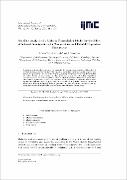Stability analysis of a malaria transmission model for the effect of infected immigrants with temperature and rainfall dependent parameters
Abstract
A human host-mosquito vector model for transmission of malaria with inflow of infected immigrants is formulated. The mosquito population includes aquatic stages (eggs, larvae, and pupae) and mature stages which have highly temperature and rainfall dependent life cycles. Model analysis reveals that the model only attains two (2) endemic equilibria; one in absence of the vector population and the other in presence of the vector population. The endemic equilibrium without the mosquito vector population is unstable. The endemic equilibrium with the vector population is locally stable and globally unstable. Numerical simulations of the model reveal that the proportion of infected humans introduced into the community does not significantly change the pattern of malaria transmission.

